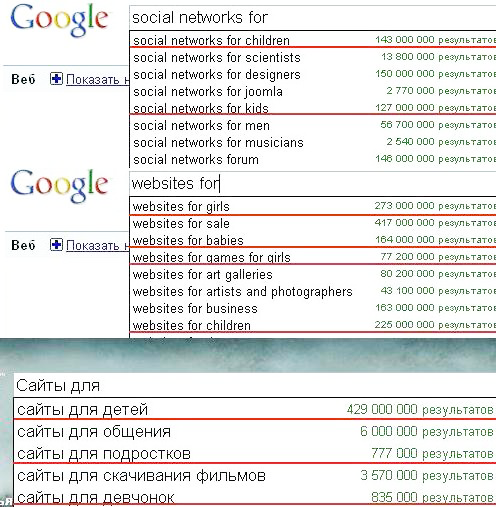
Currently, more and more children are mastering the art of searching the Internet, a world designed mostly by adults for adults. Very often adults argue about whether to allow children to use the World Wide Web or not.
The majority of researchers, specialists and ordinary users undoubtedly say YES. They are sure the Internet helps children to study, to develop and to learn the art of virtual communication which has become such an inseparable part of our lives. This has resulted in the creation of an Internet for children that is considered to be ‘safe’, a special zone similar to a dedicated children’s playground in the real world where children can communicate with their friends and play different games together. There are also sites that are online versions of children’s books: fairy tales, poems, educational books and even coloring books can be found on the shelves of the children’s Internet. Special search engines indexing only children’s pages are created entirely for junior Internet users.
The idea of a children’s Internet is very much in demand. A quick search of ‘websites for’ or ‘social networks for’ in Google brings up a list of the most popular search requests that begin with these words.
As can be seen from the screenshots, in response to the above requests Google immediately offers ‘websites for children’.
Considering the rapid growth of the children’s Internet and the total number of young Internet users, the voices of those who are opposed to children using the Internet rarely get listened to. However, some of those opponents have compelling arguments in favor of banning the use of the Internet by children. The majority of their arguments naturally centre on the delicacy of a child’s mind and how it could be adversely affected by ‘adult’ content. However this problem has a simple remedy called ‘Parental Control’, which is essentially a module that is found in many IT security solutions and is designed to block pages that children should not see.
Personally, I have concerned over another aspect of online security where minors are concerned: is the children’s Internet really as safe as we think it is? Can parents really trust those developers who assure us that the websites they have created for children are indeed completely safe both for children and their computers? In my opinion the answer to both questions is NO. In this article I will outline the threats which are lying in wait for children and their parents on the supposedly ‘safe’ junior Internet.
Antisocial elements in the children’s playground
A typical situation: you allow your child to play alone in the yard that you are very familiar with from your own childhood. A couple of hours later your offspring comes back in tears and without their favorite toy, taken from them by those with no social conscience.
The offenders can be your child’s peers, or older children, or teenagers out for mischief. Unfortunately the virtual world of social networking is no better protected from such antisocial ‘amusement’. A rude word on the ‘wall’, an offensive message on a personal page, all these are petty annoyances that can easily upset a child. It’s obvious that trivia such as this is not the most malevolent thing that can happen to a child, and indeed, it may even help a youngster to develop their own social conscience. However sometimes even adults can have trouble containing their emotions if they receive an abusive personal message, so it is only to be expected that children may react badly to such an event.
It’s even worse when the offending person is an adult. I am not speaking about trivial matters here. I mean real criminal offences against children. Children’s social networks, forums and chatrooms are ideal platforms for a pedophile to prey on children whilst pretending to be a respectable member of society. Unfortunately there are no reliable statistics regarding the number of adult users who pass themselves off as minors on children’s networks. However, it is known for certain that many users suspected of pedophilia are regular visitors to children’s networking sites and these people are a real danger.
It often happens that a child trusts their virtual friends much more than their real friends. This may lead to a child arranging to meet their ‘best friend’ without telling either their parents or schoolmates. That plays right into the pedophiles’ hands – they try very hard to gain a child’s confidence in order to arrange a meeting with the child without the knowledge of the child’s family or friends. The result is always unsavory in one way or another.
Caution! Weird Ideas!
Sometimes children get the weirdest of ideas about what they want to do or buy. Little wonder then that they pester their parents for money to put their wonderful new ideas into practice.
Many children’s websites don’t hesitate to earn extra revenue from participating in banner networks. Every fourth website for children contains an ‘Ads by Google’ banner. Context-sensitive advertisements may focus on any word on the page, words to do with ‘education’ are very popular, and by this method the fraudsters hope that they can persuade the child that they need a nonexistent grant for education, or to learn hypnosis by buying a CD for ‘Just $50’.
Curious things may happen when a context-sensitive advertisement picks up on words in the names of games. This can result in a child becoming an accidental victim of a financial pyramid, as I myself witnessed on a website for children’s games. The sincere wish of the child to help their parents to earn money may lead to regrettable consequences, as participation in any financial pyramid usually does.
Russian sites also provide similarly irresponsible offers. For example, when searching ‘websites for children’, the third website that Google returns is a website for communicating with and educating children. It contains different blogs, a chatroom, a forum and many interesting things to read. The home page of this site contains several links under the general header ‘What’s interesting on the Internet?’:
“What’s interesting” in this case turns out to be a link to a rogue antivirus program. The other three links, of which one shows a nice picture of some teen idols, lead to a site from which children can allegedly download films including ‘Twilight 3’. This film has not yet been released in cinemas. The only thing they have to do is to send an SMS to a short number.
Notably, the site offers another way of taking payment:
Translation: To make a payment, please:
- Dial the short number xxxx
- Listen to the introduction
- Enter the service code 19371
- Hold for 5 min
- After making payment use the code qg5t3tsd4 to enter the secret section of the site
According to the instructions in the screenshot above, a user must dial the short number, enter the service code and hold for 5 minutes. This 5 minute call to a premium rate number provides the fraudsters with an amount of money, part of this is considered to be for payment. Now it’s time to discover what happens when we enter the code provided in point 5 of the payment instructions, the bit about accessing the ‘secret section’. The answer is …nothing. There is no ‘secret section’ on the site. This is nothing but a trick to extort money from unwary Internet users. What makes this even worse is that the scheme appears on a children’s website!
In addition to banner networks, children’s websites also carry advertisements and other spam, for example, a message from a user who has just registered on the website or from a guest, where this functionality exists. I think these messages need to be discussed in a bit more depth because in most cases they contain an external link which leads to a malware or porn site. The majority of western sites blocks such links or informs the user that they are about to be redirected to an external website. Most Russian sites, however, allow a child to follow the link without even warning them that they are leaving the safe zone.
Of course, children’s forums, social networks and blogs have moderators whose task it is to monitor the content. However this is not a panacea – moderators cannot check every message. Popular forums often create special threads where users can inform moderators of malware or porn links placed on the websites. Undoubtedly, responsible users are very important, but if they complain of a malicious link, it means they have already followed it.
Very often banner nets and forum adverts (especially western ones) contain seemingly attractive offers – modeling agencies for children or educational grants, etc. This is another type of fraud where the potential victims are young children and their parents. For example, children are offered a place at a prestigious college or the chance to become a model at the age of nine or ten. In fact, these organizations just target parents who are ready to pay a fortune to secure the future of their children. As a result, they spend even more money to get the grant than they would if they just paid for the education. A course at an expensive modeling studio will end up with the child’s photo being added to a database that famous producers searching for talent will never get to see.
Pocket money
How much money are you ready to give your child for their own needs? I don’t think anyone would sacrifice their monthly salary for this purpose because any child would surely waste all the money or the money would be stolen from them. So why then do many users think that the same thing will not happen to their children while they are surfing the Internet?
A recent study showed that about 25% of British children use their parents’ credit cards to pay for Internet services. This figure is different in each country. However youngsters with access to credit card information are targets for fraudsters everywhere. We know of many instances of nefarious eBay sellers demanding that children pay up front for goods that the seller has no intention of sending.
Luckily, at present there are no recorded cases of child-targeted phishing on the Internet. However, IT security specialists forecast this type of fraud will appear very soon, given that children may very easily be persuaded to enter their parents’ credit card details on a phishing site.
Rusty nails in the sandbox
Dirt getting into an open wound on a child’s finger may cause tetanus. The Internet in general and children’s websites in particular may cause infections of a different kind.
Every day our antivirus detectors register about 20 children’s websites infected with malicious code. Some of these websites offer goods for children, but the majority of them are educational or gaming websites that receive more than 100 hits per day.
If your computer is not protected by an antivirus program, you are putting it at risk by allowing your children to surf the Internet.
Raising a child’s awareness of pedophiles and how they operate is the main way to protect against harm in that instance. However, it won’t assist in cases where malware is involved: exploits can enter a computer via any number of software vulnerabilities.
Below is the result of two hours of surfing the children’s Internet with my antivirus protection disabled:
It is important to remember that any website can be hacked, which means that any antivirus program installed on your computer must be enabled, even if your child only visits apparently harmless children’s resources.
What if your child is socially irresponsible?
Children learn fast. We want them to learn only good things. However, they learn what they think is good.
Thanks largely to Hollywood, children consider hacking to be cool and this influences their plans for the future. This was probably the motivation for one Japanese teenager who hacked an online game and stole 360,000 virtual dollars. Another example is a 9-year old schoolboy from Virginia who hacked the remote education system at the Blackboard Learning System.
In fact, it’s dangerous to consider hackers as cool. Children must understand that hackers are no different to other common criminals, only they commit their crimes on the Internet.
Unfortunately, children often feel that they can act with impunity when surfing the Internet. This may be the reason for their frequent attempts to sell nonexistent goods on eBay in order to earn illegal money. Sometimes they go a little too far: for instance, a 10-year old British girl tried to sell her own grandmother, presenting her as an “Annoying, but rather nice old lady”. She got a lot of responses, however, not surprisingly the deal failed to go through.
In fact the problem of children’s poor online behavior is their parents’ responsibility. No antivirus solution can ever persuade a child that being a hacker or selling their grandmother is not good if they lack any basic awareness of right and wrong.
Conclusion
So do we allow children to surf the Internet? Whatever we think, the answer must be YES because children need to know how to communicate in the virtual world as much as they do in the real one. Additionally, the opportunities for learning about the world and the amount of knowledge available on the Internet are practically boundless. By preventing a child from using the Internet, adults deprive them of access to the world’s biggest source of information.
A more correct question is ‘Shall we allow children to surf the Internet unattended?’
The average age at which a child takes their first steps online is between five and six years old. In major cities, that age can be as low as three or four years old, with very few children starting school never having surfed. However, the Internet is principally an adult world and as in the real world, there are things which children do not understand and that are dangerous for them.
Who must be the first to help and support children to experience the Internet? Their parents of course! We would not dream of allowing our children to wander off alone in a big city because we know about the dangers lying in wait for them there. Unfortunately the Internet does not give rise to the same level of concern. Currently, over 70% of teenagers surf the Internet unsupervised. For children aged between four and seven years old this figure is much lower, but it is still worrying.
Generally, parents and children go on to the Internet together only when a child is learning to surf the web. At this stage adults help their children to become familiar with the new environment. But when their offspring start to get the hang of what they are doing, many parents consider that their mission is fulfilled. However, it’s just beginning – children are very naïve and credulous, they cannot appraise situations properly, and besides that, they are easily hurt. Parents and children surfing together may help to resolve a lot of problems of a different nature too. It’s clear that a 10-12 year old boy or girl already wants some privacy in their virtual communications with friends and will hardly be happy if their parents are constantly present. By that age a child should already know what is good and what is bad when online. This being the case, parents can allow their children to surf the Internet on their own; there is no need for a mother and father to sit next to them looking through their correspondence and controlling their every step. Now the parents’ duty is to help and support their children in difficult situations. As for younger children, they will be happy to learn how to safely surf interesting websites in the company of their parents.



























Children and the Internet